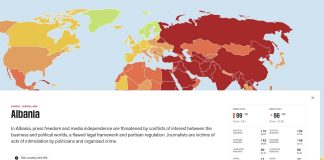Social networks are being misused as platforms for attack and denigration, particularly targeting children and women. The police confirmed that in 2023 there were 765 reports of online attacks, involving fake profiles, blackmailing with intimate photos, and deception. Meanwhile, the start of 2024 culminated in suicides suspected to be linked to defamation on TikTok. Amid experts’ alarm about the online platforms’ transformation into weapons against individuals and dignity, and the increasing reports by citizens, a draft with specific provisions for cybercrime and its punishment is being worked on by the authorities.
Anila Hoxha
“Three profiles under the name of the ‘Arben Broci’ school have been created on the social networks TikTok and Instagram.” These profiles are sharing unauthorized photos of students, accompanied by demeaning, bullying, and offensive remarks.” This was the content of the report made by a 54-year-old teacher, who teaches at these schools, alerted the police in mid-February of this year.
Adolescents, victims, and perpetrators of social media abuse
Police investigations revealed that the individual suspected of opening the profiles on TikTok, where students of the “Arben Broci” school are denigrated, is a 15-year-old boy. He is being investigated while at large for “Computer Forgery,” an offense specified in Article 186/a of the Penal Code, providing for a penalty of 6 months to 6 years in prison.
As a clinical psychologist since 2013, Anxhela Peza expresses concern about the intimidation on TikTok by minors towards their peers. The psychologist describes how hate speech is escalating, creating an alarming situation. She testifies to specific incidents of abuse and blackmail on the network:
“I am treating teenagers whose photos have been stolen and used on this platform for blackmail, with the intent to discredit them or create anxiety and bullying situations. In some cases, even to obtain something in exchange for money, mostly, or to secure a relationship, but also for revenge. The parents arrive at the clinic concerned and tell me about the change in their child; they say the child has been bullied on TikTok.’
This is the case of a 13-year-old girl from Durrës, who testified in the presence of her parents, who lodged a complaint with the police.
“They took my photos and posted them on TikTok, creating fake profiles with offensive descriptions,” the girl confessed. The police explained to Faktoje that, after investigations, they identified a peer of the girl, from Cudhi village of Kruja, as the person who opened the profile. This case is also being investigated, and the individual is currently free, facing charges of computer forgery and unauthorized access to computer data.
Denigration on TikTok doesn’t spare anyone, including law enforcement officers
In August 2022, video footage and photos of a traffic police officer, Q.S., went viral on social media. This occurred shortly after he had fined an individual for not wearing a seatbelt and for using a cellphone while driving. Officer Q.S. sued K.B. and presented TikTok videos as evidence to the judge. In these videos, the defendant is heard swearing to have people corrupt the officer, labeling him as a drug user.
“The publication of these videos on TikTok, Facebook, and Instagram has elicited comments that have damaged my personality, honor, and morality, undermining my credibility among my family, friends, and society. They have caused me anxiety as a result of the unpleasant experience caused by the accused person’s actions,” stated the police officer, who did not withdraw the charges during the reconciliation session.
When TikTok becomes a deadly weapon
‘On February 10, 2024, around 10:30 p.m., the police were notified that citizen S.A. had fallen from the height of a four-story building on ‘Teuta’ street in Bathore. She was later pronounced dead at the hospital. Examination of her phone revealed that the victim had communicated on social media with the person under investigation regarding a photograph that was published on TikTok,” stated the prosecutor in the request for security measures against A.Ç, the suspected individual accused of blackmailing the 27-year-old woman, ultimately leading to her tragic demise. The accused is currently in pretrial detention awaiting trial for this grievous incident.
Statistics on TikTok Reports
Over the past 5 years, reports of harassment, assaults, or online scams have quadrupled. In 2019, there were 182 reports in this category, whereas in 2023, they surged to 765, as per official police data.
Despite the lack of detailed information on which platforms see more abuse, the police acknowledge that TikTok has become a breeding ground for hate speech and blackmail, affecting dozens of citizens, especially minors.

| Cybercrime Trend |
“The victims have reported to the Directorate for Cybercrime Investigation that unauthorized individuals have created profiles on social networks like TikTok, Instagram, Facebook, etc., using the victims’ photos and personal information. Furthermore, through these fraudulent profiles, photos or videos of the victims with offensive and derogatory captions and content are being posted.
Other forms of crimes occurring on social networks include blackmailing for the publication of intimate photos or videos, with the aim of gaining monetary value or stealing the victims’ personal accounts, intending to recover them against a specified payment,” explained Ervina Gjana, Director of Cybercrime Investigations at the Department of Criminal Police, to Faktoje. She finds the situation particularly concerning for minors and women, who are victims of ‘online violence.’
“We can say that the majority of complainants are female. Unauthorized individuals create accounts with their personal data, aiming to damage their image,” Gjana elaborated.
According to her, in 2023 alone, 440 suspects were identified as committing crimes in the virtual world through blackmailing and online threats.
“About 70% of these cases involve criminal acts related to forgery and computer interference, stemming from citizens’ reports of creating fake profiles using various individuals’ data, posting photos and videos of different people, including minors, with denigrating content, threats, and harassment,” underscores the State Police official.
Law on Cybercrime Punishment
For over a year now, both as a Member of Parliament of the Socialist Party in the integration commission and as Minister of the Interior, Taulant Balla has been advocating for stricter laws against online attacks, even proposing the closure of TikTok.
“Cyber persecution is absent from our current legislation. Cyberbullying, hate speech online, and the incitement of violence through hatred — all of these issues need to be addressed by enhancing our laws,” stated the Minister of the Interior recently. He also mentioned establishing constructive dialogues with major social media companies, including TikTok and META, the owner of Facebook, Instagram, Snapchat, and others.
“We must enhance our legislation to address these issues and redirect society’s focus to this phenomenon,” emphasized Taulant Balla.
Faktoje learned that new draft is being prepared to strengthen the Penal Code against individuals who engage in harassment using electronic communication tools or misuse online networks.
One innovative aspect of this draft is its provision for harm caused by the dissemination of materials, defamation in the public sphere, and even the most extreme cases involving harm to citizens’ lives and health. Here are some of the key provisions of the proposed draft:
“Harassment through the use of electronic communication tools.
- Anyone who, without authorization, initiates electronic communication with the aim of coercing, intimidating, harassing, or causing significant emotional distress to another person through a cyber system, misuses personal data, induces others to contact the victim, threatens harm to their life, physical integrity, health, or freedom, or that of a close relative or another closely associated person, shares an image of the victim, one of their close relatives, or another closely associated person, or makes it accessible to the public, disseminates materials containing content that makes the victim uncomfortable or degrading in the public opinion, falsely claiming authorship, or makes them accessible to the public, or engages in other severe, repeated, and hostile behaviors, shall be punished by imprisonment from one to four years.
- If this offense results in the death of the victim or severe harm to their health, a close relative of the victim, or another closely associated person, or if it puts the victim, a close relative, or another closely associated person at risk of death or serious injury to health, the perpetrator shall be held responsible for the consequences as stipulated in the specific provision of this Code, depending on the form of fault exhibited by them.
- If the victim is a minor, the collective penal sanction for the committed offenses is increased by up to one half.”
The absence of effective legislation has resulted in the majority of the 330 suspects for online attacks either being processed while at large or escaping criminal accountability.
This article was prepared by Faktoje as part of the project ‘Say Yes to Love, No to Hate Speech,’ supported by the regional initiative of the United Nations Agencies “Youth for Inclusion, Equality, and Trust,” funded by the United Nations Peace Fund. In Albania, this initiative is implemented by the local offices of UNFPA and UNDP.
The opinions expressed here are the responsibility of the author and do not necessarily reflect those of the United Nations Peace Fund, UNDP, or UNFPA.










